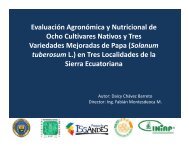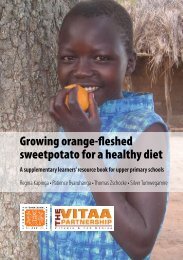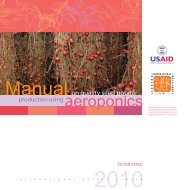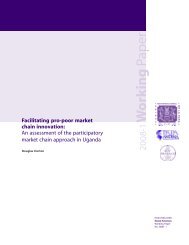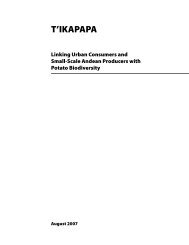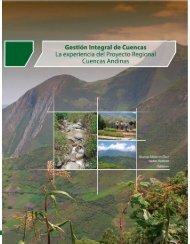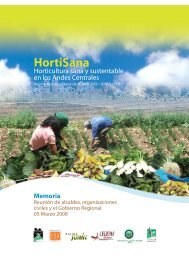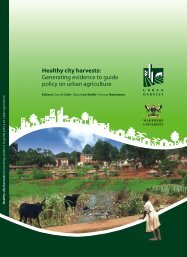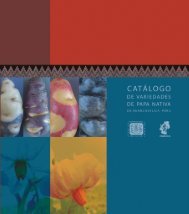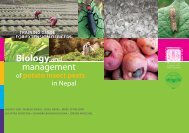Impacts of Urban Agriculture Annual Report.p65 - International ...
Impacts of Urban Agriculture Annual Report.p65 - International ...
Impacts of Urban Agriculture Annual Report.p65 - International ...
- No tags were found...
You also want an ePaper? Increase the reach of your titles
YUMPU automatically turns print PDFs into web optimized ePapers that Google loves.
invited to attend this public presentation <strong>of</strong> the workingplan <strong>of</strong> the Unit. The Unit functions as a neighbourhoodservice centre for agricultural producers and localpeople. It promotes better links and understandingbetween producers and consumers by <strong>of</strong>fering training,information new marketing opportunities andmediation with the municipal authorities. With some c<strong>of</strong>inancingfrom <strong>Urban</strong> Harvest, the municipalitymanaged to put together a budget <strong>of</strong> US$100,000 withthe aim <strong>of</strong> promoting activities that support the Unit’sobjectives:(1) To encourage producers to farm in a sustainable,economically viable way using fewer chemicals; (2) Tointervene in local planning, including promotinglegislation for the productive use <strong>of</strong> vacant lots; (3) Topromote improved practices and diversification <strong>of</strong>agricultural activities that contributes to higher income.Included in its action plan is the acknowledgement <strong>of</strong>the need to develop ways <strong>of</strong> integrating urbanagriculture into planning and encouraging socialintegration, including analysis <strong>of</strong> the roles <strong>of</strong> men andwomen. During these two years, the local <strong>Urban</strong><strong>Agriculture</strong> Unit has worked directly with more than 700local producers, helping them with training courses andmarket opportunities and applying the technical skillsdeveloped by the collaborative efforts <strong>of</strong> producerinnovators and the <strong>Urban</strong> Harvest research teamthrough the <strong>Urban</strong> Field Schools (see article page 20and list <strong>of</strong> publications).To facilitate the exchange <strong>of</strong> ideas and experiencesbetween districts <strong>of</strong> Lima and with other Latin Americancities where urban agriculture has become prominentand an integrated aspect <strong>of</strong> urban governance, a thirdinternational meeting was held in August 2006. Themeeting included presentations by participants fromBogota (Colombia), Mexico city (Mexico), Rosario(Argentina) and Havana (Cuba), as well as by two districtmayors from the city <strong>of</strong> Lima with pioneer urbanagriculture programs. These experiences were used todevelop proposals for a comprehensive urbanagriculture program relevant at the level <strong>of</strong>metropolitan Lima.A key activity within its research theme on stakeholderand policy dialogue has been <strong>Urban</strong> Harvest’scooperation with the local <strong>Urban</strong> <strong>Agriculture</strong> Unit toexplore forms <strong>of</strong> engagement with the policy makingprocess. Drawing on local networking linkages (seearticle, page 41 and list <strong>of</strong> publications ), unit managerswere trained by staff <strong>of</strong> the Institute for the Promotion<strong>of</strong> Sustainable Development (IPES), a partnerorganization specializing in policy-related aspects <strong>of</strong>urban agriculture. Training complemented <strong>of</strong>ficers’existing practical experience <strong>of</strong> municipaladministration, by adding strategic planning andpolicy formulation aspects <strong>of</strong> urban agriculture. As aresult, Unit staff recognized the need to strengthenlocal agriculture through a participatory process thatincludes integrating all municipal actors, includingproducers, consumers, public managers and NGOs,among others. In this way, the municipality has beenable to adapt its structure according to the needs <strong>of</strong>its people.The Unit has generated a workplan to support thoseinvolved in urban agriculture. The plan includes steeringthrough the local legislative process a series <strong>of</strong>ordinances defining good agricultural practices – a usefuladdition to the by-laws since up to now, agriculture haslacked specific regulation in metropolitan Lima. Theworkplan also focuses on issues such as access to land,land tenure, access to and quality <strong>of</strong> water, access t<strong>of</strong>inance (micro-credits), strengthened marketing andprocessing channels, environmental conservation,organic waste treatment and the quality and safety <strong>of</strong>agricultural products. All <strong>of</strong> these issues affect most <strong>of</strong>those involved in local agriculture, who live in the areaand who consume products from the area.35



